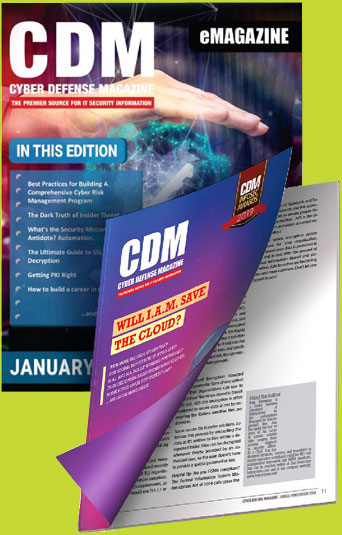Authored by the Publisher of Cyber Security Magazine Deep fake videos and audios – including phone calls from cyber criminals, dropped USB sticks near your house loaded with computer viruses, free offers, email attacks with ‘drive-by’ computer viruses, smart-everything (weak and hackable internet of things devices), malicious apps on our phones and tablets and laptops and desktops, driveby malware, distributed denial of service attacks and so much more abound in our world – my team and your family and business is bombarded with this garbage, on a daily basis. There is one purpose – to steal data. They want identities and they want YOUR money. It’s that simple. If we don’t stop these cyber scrooge bad guys by using common sense, they will deceive us and others we trust and victimize our families, our friends and our businesses.
Avoid The Cyber Scrooges and Porch Pirates
As we continue through work from home (WFH), we used to call telecommuting, I can’t help thinking about those who are being victimized right now, as you read this – it could be you, your relative, your children or even their grandparents. Thanks to the IdentityTheft.gov and our good friends at the FTC.gov, who can help you report and recover from identity theft. But as the experts in Cyber Deception teach us, why wait? Let’s get ahead of the problem and defeat the porch pirates and the cyber scrooges, shall we?
CYBER SCROOGES
Cyber security expert Gary Miliefsky joins WMUR to discuss best tips and practices for good cyber security as online shopping increases for the holiday season.
PORCH PIRATES

During the gift-giving season, land-locked Blackbeard’s who snatch packages from doorsteps may also hack into online tracking systems. Online shopping has made life easier for consumers and is especially handy during the holidays. But it’s also created more opportunities for “porch pirates,” the thieves who prey on those parcels left on doorsteps. Many porch pirates are low tech, simply cruising neighborhoods where they know deliveries are taking place and grabbing the unattended packages. But porch pirates who also happen to be cyber criminals can use your own technology against you. A more sophisticated porch pirate might send you an SMS message or email with malware. That would let them gain access to your computer or smartphone, and they could install a RAT (Remote Access Trojan). Then they can eavesdrop on your orders and deliveries. They also might be able to locate you through the geolocation feature on your phone. That would tell them when you are away from home, the final link in their well-laid plan. Here are tips for outwitting porch pirates and keeping those packages safe:
- Get permission to ship all your packages to work. That way they aren’t left unguarded at your doorstep for hours where anyone walking by could snatch them. If this arrangement works out, be sure to tell all your friends and family also to ship packages to your work address.
- Ask a friend or neighbor to receive your packages for you. You might not be home on work days, but plenty of people are. Trusted friends who are retired or who work at home might be happy to let you have packages delivered to them for safe keeping.
- If a neighbor can’t receive your packages and you can’t get them at work, another option is available. Try a service that lets you arrange for a package to be held at a warehouse until you arrive home. Then you can arrange delivery for evening hours that better suit you. More research you’ll need to do is available at Venture Radar.
- Disable geolocation on your smartphone so that porch pirates – or other hackers for that matter – can’t track your location. No need to make it easier on them.
- Set up a live recording video camera aimed at your porch. That could allow you to spot a theft as it happens and alert law enforcement, or at least provide you with video later that might help identify the porch pirates.
IdentityTheft.gov is the federal government’s one-stop resource for identity theft victims. The site provides streamlined checklists and sample letters to guide you through the recovery process. Visit ftc.gov/idtheft for prevention tips and free resources to share in your community. About our Publisher, Gary S. Miliefsky He is also an expert on Cryptocurrencies and related fraud as well as most issues pertaining to ICOs, Bitcoins, Blockchain technology and Ransomware. His recent bestselling book being update for an early 2022 release rated nearly 5.0 stars, is entitled Cryptoconomy – Bitcoins, Blockchains and Badguys, available here: https://www.amazon.com/Cryptoconomy-Bitcoins-Blockchains-Bad-Guys-ebook/dp/B07KPNS9NH/ Here’s Gary’s IMDB Profile. Gary is actively on National TV, Radio and in Print. P.S. Here’s Identity Theft dot gov Privacy Policy OMB CONTROL#: 3084-0169 Under the Paperwork Reduction Act, federal agencies are not allowed to collect information from the public without a valid OMB control number. Everyone should understand privacy policies.
All content including Text, Links, Images and Videos provided by CDMG under Fair Use. Sources: Cyber Security Magazine, Cyber Defense Magazine, IdentityTheft.gov, Venture Radar and WMUR.com FAIR USE NOTICE: Under the “fair use” act, another author may make limited use of the original author’s work without asking permission. Pursuant to 17 U.S. Code § 107, certain uses of copyrighted material “for purposes such as criticism, comment, news reporting, teaching (including multiple copies for classroom use), scholarship, or research, is not an infringement of copyright.” As a matter of policy, fair use is based on the belief that the public is entitled to freely use portions of copyrighted materials for purposes of commentary and criticism. The fair use privilege is perhaps the most significant limitation on a copyright owner’s exclusive rights. Cyber Defense Media Group (CDMG) is a news reporting company, reporting cyber security and cyber defense news, at no charge at our websites Cyber Defense Magazine for B2B and B2G and Cyber Security Magazine for G2C and B2C. All images and reporting of cyber news are done exclusively under the Fair Use of the US copyright act.


